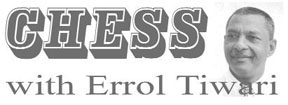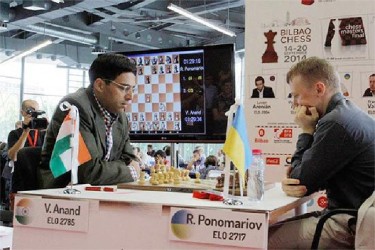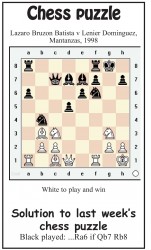The big news circulating in the international chess world is Fabiano Caruana’s riveting performances in the Sinquefield Cup, St Louis, USA. The 23-year-old grandmaster won his first seven games and clinched first place way before the tournament ended. Caruana’s victories included his round three rout of the world champion, Norway’s Magnus Carlsen; and his defeat of Levon Aronian of Armenia, who was ranked No 2 in the world before the tournament began; Veselin Topalov of Bulgaria, a previous world champion; Hikaru Nakamura, the US top player; and Maxime Vachier-Lagrave of France. All are among the world’s top nine players. According to the competitors’ average rating (the system used to rank players), the Sinquefield Cup was the strongest in history.
 Caruana’s remarkable achievement at the start of the Sinquefield Cup has no equal. In 2005, Topalov began the World Chess Championship tournament in San Luis, Argentina, with six victories from seven games on his way to capturing the title. Anatoly Karpov, the former world champion from Russia, won his first six games at the 1994 Linares tournament in Spain, usually referred to as the Wimbledon of chess. His final score, 11 points from thirteen games, had been widely acknowledged as the game’s most impressive performance until Caruana’s play at the Sinquefield Cup.
Caruana’s remarkable achievement at the start of the Sinquefield Cup has no equal. In 2005, Topalov began the World Chess Championship tournament in San Luis, Argentina, with six victories from seven games on his way to capturing the title. Anatoly Karpov, the former world champion from Russia, won his first six games at the 1994 Linares tournament in Spain, usually referred to as the Wimbledon of chess. His final score, 11 points from thirteen games, had been widely acknowledged as the game’s most impressive performance until Caruana’s play at the Sinquefield Cup.
In October, some 500 chess players from 39 countries will compete at the Planet Hollywood Casino in Las Vegas, in a tournament for the largest prize fund in the history of chess, US$1 million. The entry fee per player is a hefty US$1,000. The tournament, called Millionaire Chess, is intended to be the first step in a multi-year plan to organize and run tournaments with big prize funds, according to Amy Lee, a Canadian entrepreneur who is financing the event. The tournament is being organized by the African-American grandmaster Maurice Ashley. The idea behind Millionaire Chess is to raise the profile of the game. In its 1,500 history, chess has not been recognized as it should have been. This has been the critique of many grandmasters. But this state of affairs was changed somewhat by the American grandmaster Bobby Fischer before he played the world championship match in 1972. Millionaire Chess will contribute to Fischer’s input by making the game exciting in order to attract additional sponsorship.

In other chess news, the strongest woman ever to play chess, Hungarian grandmaster Judit Polgar, 38, announced her retirement as the 2014 Tromso Olympiad drew to a close. Polgar was one of the greatest prodigies in chess history. In 1989, at age 12, she became the first female player to be ranked among the world’s top 100. Two years later, she became the youngest player to earn the grandmaster rank, breaking the record Bobby Fischer set in 1958. She never relinquished her spot on that list and until recently was the only woman on the list. China’s Hou Yifan joined her last month. Polgar was ranked as high as eighth in 2004 and 2005, but she is currently No 65 on the current list. Polgar’s path to success was laid out by her parents who began training her and her two older sisters when they were children. They became famous as the ‘three Polgar sisters,’ with two grandmasters and one international master in the experiment to achieve supremacy in chess. At Tromso, Judit competed for Hungary and in the process helped her country win a silver medal.
On the local chess circuit, nothing is happening. But I continue to look forward to the consideration of introducing a points system for selecting our Olympic players. The method offers fairness, similar to what is done when choosing a candidate for the FIDE world championship title match. It’s an elimination process in which every chess player would have an equal opportunity to go for gold.
The following games were played at the 2014 Bilbao Masters chess tournament in Spain.
Anand v Ponomariov
White: V Anand
Black: R Ponomariov
- d4 d6 2. Nf3 g6 3. c4 Bg7 4. Nc3 Nf6 5. e4 O-O 6. h3 e5 7. d5 a5 8. Be3 Na6 9. g4 Nc5 10. Nd2 c6 11. Be2 Bd7 12. g5 Ne8 13. h4 f6 14. Nb3 b6 15. Nxc5 bxc5 16. Qd2 fxg5 17. hxg5 cxd5 18. Nxd5 Rf7 19. O-O-O Rb8 20. Rh2 Be6 21. Nc3 Qb6 22. Nb5 Bf8 23. a4 Qb7 24. Qc2 Be7 25. Kb1 Qc6 26. Bd2 Bd8 27. Qd3 Rbb7 28. Rf1 Rf8 29. f4 exf4 30. Rxf4 Rxf4 31. Bxf4 Rf7 32. Bd2 Be7 33. Rg2 Qb6 34. Bg4 Bxg4 35. Rxg4 Nc7 36. Rf4 Ne6 37. Rxf7 Kxf7 38. Qd5 Qd8 39. Ka2 Bf8 40. Bf4 Qd7 41. b3 Be7 42. Nxd6+ Kf8 43. e5 Nxg5 44. Qxc5 Qg4 45. Bc1 h5 46. Qxa5 Qg2+ 47. Bb2 h4 48. Qb5 Qa8 49. c5 h3 50. c6 Bd8 51. Qd5 Bc7 52. Bc1 Qa5 53. Nb5 Qe1 54. Ba3+ Kg7 55. Nxc7 h2 56. Ne8+ Kh6 57. Nf6 Qe2+ 58. Bb2 Ne4 59. Qxe4 Qxe4 60. Nxe4 h1=Q 61. c7 1-0.
Pons v Anand
White: Vallejo Pons, F
Black: V Anand
- d4 Nf6 2. c4 e6 3. Nf3 d5 4. Nc3 Bb4 5. cxd5 exd5 6. Bg5 h6 7. Bh4 c5 8. dxc5 Nbd7 9. e3 Qa5 10. Rc1 Ne4 11. Be2 O-O 12. O-O Bxc3 13. bxc3 Nxc3 14. Qd2 Nxe2+ 15. Qxe2 b6 16. c6 Ba6 17. Qd1 Nc5 18. Qxd5 Bxf1 19. Kxf1 Rac8 20. Nd4 Qd2 21. Qc4 Rfe8 22. Qc2 Qxc2 23. Rxc2 Re5 24. Bg3 Rd5 25. c7 Rd7 26. Nb5 a6 27. Nd4 Ne4 28. Rc6 Nxg3+ 29. hxg3 Rdxc7 30. Rxb6 Rc1+ 31. Ke2 Ra8 32. Rb4 a5 33. Ra4 Rb1 34. Nb3 Rb2+ 35. Kf3 Ra6 0-1.
Aronian va Ponomariov
White: Levon Aronian
Black: Ruslan Ponomariov
- d4 d6 2. Nf3 Nf6 3. c4 g6 4. Nc3 Bg7 5. g3 O-O 6. Bg2 c6 7. O-O Bf5 8. Bg5 h6 9. Be3 Na6 10. Qc1 Kh7 11. h3 Rb8 12. g4 Bd7 13. Qd2 Nc7 14. a4 b5 15. axb5 cxb5 16. b3 bxc4 17. bxc4 Rb4 18. Qd3 a6 19. d5 e6 20. Nd4 exd5 21. cxd5 Re8 22. Rfb1 Rxb1+ 23. Rxb1 Nb5 24. Nc6 Bxc6 25. dxc6 Nxc3 26. Qxc3 Nd5 27. Qc4 Nxe3 28. fxe3 d5 29. Qxd5 Qe7 30. Kh1 Rd8 31. Qc4 Be5 32. Rf1 Kg7 33. Bd5 f6 34. Rb1 Rb8 35. Rb7 Rxb7 36. cxb7 Qd6 37. Be4 a5 38. Qb5 Qd8 39. Kg2 Bb8 40. Qc6 Qe7 41. Kf1 Bc7 42. Bd3 Qd6 43. Qe8 f5 44. Bc4 Kf6 45. Qf7+ Kg5 46. gxf5 gxf5 47. Qg7+ Kh4 48. Be6 Bd8 49. Qxh6+ Kg3 50. Qg7+ Kh4 51. Kg2 1-0.









